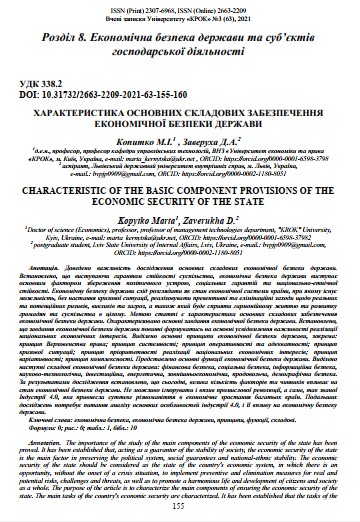CHARACTERISTIC OF THE BASIC COMPONENT PROVISIONS OF THE ECONOMIC SECURITY OF THE STATE
DOI:
https://doi.org/10.31732/2663-2209-2021-63-155-160Keywords:
economic security, economic security of the state, principles, functions, componentsAbstract
The importance of the study of the main components of the economic security of the state has been proved. It has been established that, acting as a guarantor of the stability of society, the economic security of the state is the main factor in preserving the political system, social guarantees and national-ethnic stability. The economic security of the state should be considered as the state of the country's economic system, in which there is an opportunity, without the onset of a crisis situation, to implement preventive and elimination measures for real and potential risks, challenges and threats, as well as to promote a harmonious life and development of citizens and society as a whole. The purpose of the article is to characterize the main components of ensuring the economic security of the state. The main tasks of the country's economic security are characterized. It has been established that the tasks of the economic security of the state should be formed on the basis of the awareness of the importance of realizing national economic interests. The main principles of economic security of the state are highlighted, in particular: the principle of the rule of law; the principle of consistency; the principle of efficiency and adequacy; the principle of a crisis situation; the principle of priority implementation of state economic interests; principle of variability; principle of complexity The main functions of the economic security of the state are presented. The following components of the economic security of the state are highlighted: financial security, social security, information security, scientific and technological, investment, energy, foreign economic, food, demographic security. According to the results of the study, it was found that today a large number of factors and factors affect the state of the economic security of the state. It is impossible to ignore the impact of the industrial revolution, namely the so-called Industry 4.0, which has brought significant diversity to the economic growth of many countries. Further research requires an analysis of the main features of Industry 4.0 and its impact on the economic security of the state.
Downloads
References
Шевченко Л. С., Гриценко О. А., Макуха С. М. та ін. Економічна безпека держави: сутність та напрями формування : монографія. Харків : Право, 2009. 312 с.
Ліпкан В. А. Безпекознавство. Київ : Європейський університет, 2003. 208 с.
Карвацка Н. С. Світові економічні кризи: причини виникнення, наслідки, інструментарій розв’язку. Вісник Хмельницького національного університету. 2011. №2. Т.2. С. 53–60.
Урба С. І. Система економічної безпеки держави: сутність та особливості формування. Науковий вісник Міжнародного гуманітарного університету. Серія : Економіка і менеджмент. 2017. Вип. 26(1). С. 22-25.
Нікольчук Ю. М. Фінансова безпека регіону як ключовий компонент фінансової безпеки держави. Вісник Хмельницького національного університету. 2018. № 2. С. 68-71.
Мандзіновська Х. О. Економічна безпека держави: сутність, складові елементи та проблеми забезпечення. Наукові записки Української академії друкарства. 2016. № 2. С. 159–166.
Сибур З. В. Зарубіжний досвід забезпечення економічної безпеки держави. Інвестиції: практика та досвід. 2018. № 11. С. 112.
Сидор Г. В. Економічна безпека держави: погляд крізь призму митного регулювання інвестиційних процесів. Науковий вісник Івано-Франківського національного технічного університету нафти і газу. Серія : Економіка та управління в нафтовій і газовій промисловості. 2019. № 2. С. 133-141. URL: http://nbuv.gov.ua/UJRN/nvifnunge_2019_2_14.
Методика розрахунку рівня економічної безпеки України. URL : http://me.kmu.gov.ua/control/uk/publish/article?art_id=97980&cat_id=38738.
Варналій З. С. та ін. Економічна безпека : навч. посіб. / за ред. д-ра екон. наук, проф. З. С. Варналія. Київ : Знання, 2009. 647 с.



